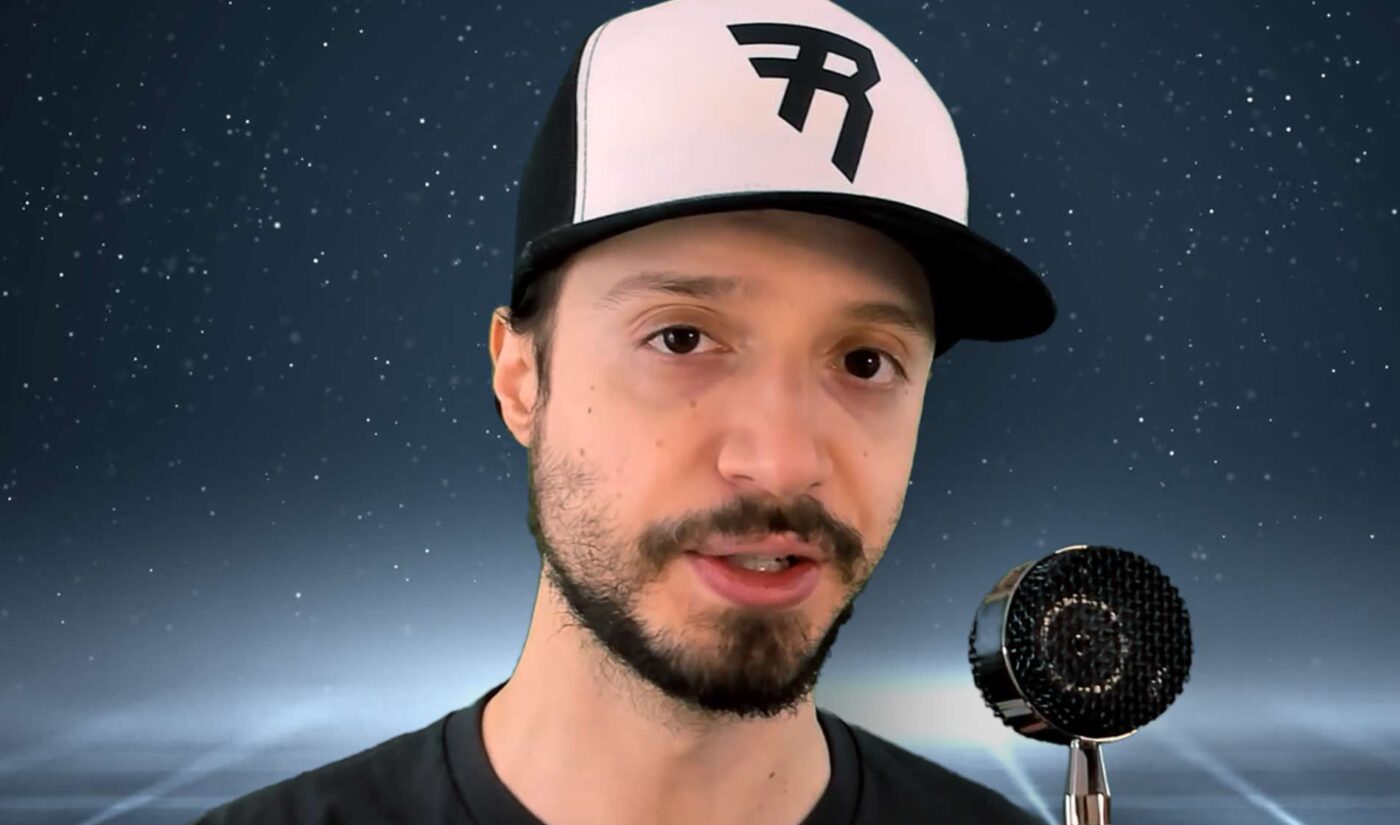Welcome to Streamers on the Rise, where we find streamers who are growing their channels, content, and audiences in extraordinary ways. Each week we’ll talk with a creator about what goes into livestreaming–both on and off camera.
When Rhykker first started streaming, he had an audience of around five people.
It was a decade ago, in Twitch‘s early days, and he was streaming Dungeons & Dragons games. He didn’t care that his audience was small. “It was just me and my buddies having fun and sharing the passion of the hobby,” he says.

Subscribe to get the latest creator news
Dungeons & Dragons was his main fare until 2012, when Diablo III came out. Rhykker was, of course, a longtime fantasy fan, and Diablo was the perfect game for him. He switched things up and began making YouTube videos about it–everything from in-depth game guides to news coverage about the franchise’s future.
He was used to covering news: In his day job, he was a games journalist writing for The Escapist. But then, in 2016, he and a bunch of other staffers were laid off.
For him, it was the chance to sit down and really look at the content side of things. He was no longer streaming to just a handful of people. His game guides on YouTube had begun drawing people over to his Twitch streams, where they could see another side of him (one without the “YouTuber voice,” he jokes), ask questions about his guides, and just chat about things outside of gameplay.
“I’ve always wondered, could this side business be built into a full business? Would it scale up? I would never quit my job to try, but I’m like, ‘Well, I was laid off,'” he says.
He decided to give himself three months. For three months, he would put everything he had into creating content full-time, and see if he could make it his new career.
We’ll let him tell you how that worked out below.
This interview has been edited for length and clarity.
Tubefilter: So pretend someone’s reading this and doesn’t know who you are. Give me some background about you and how you ended up on Twitch.
Rhykker: Yeah, absolutely. Well, so, I’m from Montreal, Canada. Ever since I was a kid, I was into video games. It’s how I bonded with my dad when I was young. I became a huge fan of Blizzard games, in fact. Then basically, gosh, I got started on YouTube, not for video games, but for Dungeons & Dragons, which is my other major passion in life. I started to create content on YouTube and on Twitch. I would stream my Dungeons & Dragons games to like five to 12 viewers. It was just me and my buddies having fun and sharing the passion of the hobby.
It didn’t really matter how many people were watching. It was just being able to share it with people. Then Diablo III was coming out in 2012. That became a huge part of my life from there. My YouTube channel and my Twitch stream, after a couple of years, I started to bring on Diablo content. That’s when things really started to grow, and the shift went from Dungeons & Dragons to Diablo III. Since a few years after Diablo III, Diablo IV was on my mind already. Basically, the past several years have all been leading to the release of Diablo IV, which happened in early June. That’s, of course, when a lot of creators on Twitch, on YouTube, just saw big explosions in their numbers.
Tubefilter: Presumably you were one of them.
Rhykker: Yeah, especially during the month of June, numbers were just insane for the launch period of DIV on Twitch.
Tubefilter: I remember seeing StreamElements’ report about how significant Diablo IV viewership was. Like it was a significant part of all of Twitch’s traffic, across all niches.
Rhykker: Oh, I believe it. I believe it. Yeah, it was also aided by Blizzard doing some interactions with Twitch that rewarded people for watching streams, and gifting subs to streamers, where they would get cosmetics in the game. So that I think also really helped. That combined with the hype of the new game really drive up numbers across the board.
Tubefilter: Yeah, definitely. When and how did content become your full-time thing?
Rhykker: Content creation across YouTube and Twitch has been my full-time thing since 2016. After I graduated university in science, I wanted to get into writing. This is my passion throughout my life, was writing and video games. I wanted to get into the video game industry. I got a job as a video game journalist back in the day after a few years of doing that. I started doing the YouTube and Twitch stuff on the side, and that was building up, building up as a little side business. I was writing for The Escapist back in 2016. Then a bunch of us were just laid off. This was right before they did the big turnover to the new Escapist.
So, you know, when I was laid off, I’m like, okay, I’ve always wondered, could this side business be built into a full business? Would it scale up? I would never quit my job to try, but I’m like, “Well, I was laid off. I need to give myself three months to try to make this work full-time.” So I made the shift in hours to full-time YouTube and Twitch, and I’ve been immensely fortunate that it has worked out since then as a full-time gig.
Tubefilter: One thing almost every single person I’ve spoken to for this column has talked about is the difficulty of growing on Twitch, because Twitch does not offer a lot of discoverability. But you have a big presence on YouTube, too, so I’m curious about your experience is with growing your platform on YouTube and Twitch.
Rhykker: So you highlighted the key point, that discoverability on Twitch is really poor. It’s the biggest weakness of the platform, where you basically have to go outside of Twitch to get people to find you on Twitch. So I had my YouTube channel. I had my guides for the game, so people would find my guides, and then they would see, oh, you know, “I see that he streams on Twitch. Let me go there to ask him questions about the guide.” Twitch really started as a way to interact with my community, and to be able to answer questions. That, I think, was a large wave. That’s probably what was the main funnel of discoverability of bringing people from YouTube over to Twitch to build up my Twitch audience.
Tubefilter: Do you feel like in terms of your audience growth, like currently your continued growth, do you feel like Twitch is getting better in terms of discoverability? Or do you feel like it’s still you building this community outside of Twitch, then people are coming to Twitch for more of you?
Rhykker: That’s a really good question. I don’t know that there’s been any major improvements in discoverability across Twitch. It still does feel like, I think nowadays there are more venues to gain discoverability. We see Twitter, we see TikTok. We’re seeing other places where you could get discoverability more easily, and again, use that as a funnel towards Twitch.
Tubefilter: I do have to ask, what do you think of Baldur’s Gate 3?
Rhykker: Baldur’s Gate 3. I am so happy for Larian and their success. I think they’re likely to be the best CRPG possibly ever. I’m going to put an asterisk on that. But just to see the popularity of the game, I think what we’re seeing is the culmination of many, many years of their efforts of building up a successful studio that can make really good quality CRPGs, using that to leverage their reputation to get ahold of the Baldur’s Gate and Dungeons & Dragons brand, and then rocket that, you know, take all the lessons they’ve learned, rocket to success with it.
I’m so happy to see so many people playing this game, because CRPGs are a little more niche. Not a lot of people generally like playing turn-based games, but I think they’re just, their absolute, their desire to just want to make a good game and not just make money. They’re kind of making games the way games were made in the ’90s and the early 2000s, where it’s just a box product. There’s no further monetization, and I think people are just so happy to see that purity. That purity from the developers of, you know, “Hey, this isn’t a cash grab. This is a gamer’s game from people that want to make a game.”
I think that’s being rewarded with extra interest from people that are just tired and fatigued from all the different monetization models, and they’re more willing to give this kind of genre a chance that maybe they wouldn’t have otherwise been super into.
Tubefilter: Totally true. What is your current spread of like production? How often do you stream? How often are you producing videos on YouTube? Is it a set thing or do you just sort of put out what’s working for you?
Rhykker: So I have three streams a week that can vary from three to six hours at a time. Those are fixed: Monday, Wednesday, Fridays. That’s because one of the key pieces of advice I give to any new streamer is just be consistent. Whatever you decide as your schedule, be consistent with it so that viewers know when to find you. They know, okay, even if it’s a once a week, at least they’ll come back on that once a week. Then for YouTube, I have my minimum once a week Saturday news video. Then on top of that, I try to do at least one other video per week depending on what’s going on.
Like, especially when there’s something new in Diablo, I’m covering a lot of Diablo content. With Baldur’s Gate having just released, I wanted to jump on some Baldur’s Gate content. I put out a beginner’s guide video, but it’s a very big game to learn.
Tubefilter: Yes. That’s what interests me a lot, is you’re still very much bringing your journalist background into your content on YouTube. I find it really interesting that you mentioned earlier that you make guides, and then people come from your guides to talk to you on Twitch.
Rhykker: There’s the guide content, there’s the journalism content, and my streams are also, they’re very discussion-focused as opposed to gameplay-focused. Like half the time you come by one of my streams, we’re talking about something. It could be some news in the video game industry. I love talking game design philosophy-type stuff, or just anything. Half of it is basically a just-chatting stream.
Tubefilter: It’s just cool that you have these different mixes of presentations in terms of edited/VOD content, and then you being live, and then having that ability to just chat with your audience outside of gameplay I think is probably a part of why your audience is growing significantly.
Rhykker: You hit upon it there. On my Twitch streams, some people who just know me from YouTube when they’ll come by the Twitch streams, they’ll see that different side of me. I think one thing that’s sometimes brought up, some people are like, “Oh, I can’t stand Rhykker’s fake YouTuber voice.” Then they’ll come by the stream and be like, “Oh, he doesn’t talk like that all time.” I don’t know that I do it fully consciously. On YouTube, I’m really focusing on trying to pronounce my words properly.
Tubefilter: Nooo, I feel like that’s become such a thing. People are like, “Oh, the YouTuber voice,” derogatory. Like, okay, do you want to understand what people are saying or not?
Rhykker: That’s the thing, right? Whereas, Twitch, it’s a lot more conversational.
Tubefilter: Back before this became your career, did you have any kind of inkling that this could become a full-time thing? When you started that three-month trial, did you really feel like it was going to be a thing?
Rhykker: If you’d asked me like 15 years ago if I ever thought I would be doing this, the answer would be no, not a chance. When I did give myself those three months, it was because I did figure there was a decent shot of it happening. Because again, I was seeing the revenue that I was making just doing that as a side gig. I’m like, “Okay, well, this, it’s decent money.” As a game journalist, I wasn’t making much money.
I’m like, “Okay, if I put in more hours, will the money scale up linearly, or is it going to taper off?” That was the main question as to whether it would become sustainable as a full-time thing. I did think it was possible. I did think it was possible, but it did hinge on the ability to continue to churn out content. That’s the issue. It’s this never-ending content treadmill, because once I could no longer funnel people from YouTube, then Twitch is going to fall off as well presumably.
That’s actually when I started to run out of Diablo content. That’s when I settled on this, okay, once a week news video, there’s always going to be news. There’s always content there at least. There’s always something happening somewhere in the video game industry that I can talk about in a once-a-week video.
Tubefilter: How much time goes into your YouTube videos behind the scenes?
Rhykker: The news videos are a lot of work.
Tubefilter: Are you doing all the editing yourself?
Rhykker: I do, yes. Everyone tells me, “You should get an editor, you should get an editor.”
Tubefilter: You should get an editor.
Rhykker: [laughs] Honestly, if I wanted to grow my business more, logically, that is the next step. It’s a step I should have taken a long time ago.
Tubefilter: But giving up that kind of control is hard.
Rhykker: It is. I think to some degree it’s also like, there are things that I can delegate away, but at what point of delegating things away is it no longer me? That’s, I think, the part that I have trouble with. I’ve been trying to find ways to get people to help me with different things. Part of the other reason is the content churn, especially on a news video, the turnaround needs to be so fast that by the time I would hand this off to someone, they need to be on my crazy schedule, and then by the time they get it back to me, can I have it ready to go?
Or by that point will more news have developed, and then I’d have to edit the video. I’m sure there’s some way to work it out, but the news video is like easily 16 hours of work between.
Tubefilter: Oh, wow.
Rhykker: Yes. Because it’s a wrap-up of all the week’s news. I’m doing the news dives to find the stories. I’ll have a list of maybe 40 stories that I’m considering covering. Then I go through and I research them a little bit more. I cut down the list of the stories that I really want to cover that I think are the most important to cover. Then I got to do the actual full research on every story for accuracy, fact-checking. Then I put my notes together as a rough script, then I can record the video, then there’s all the editing, and then the post-production and everything.
Tubefilter: Barely any work at all.
Rhykker: Exactly. It’s super easy.
Tubefilter: Do you have a specific platform you feel like you’re focusing on more, or is it an even split between YouTube and Twitch?
Rhykker: I consider myself a YouTuber first, streamer second. The streaming side has always been connected to the YouTube, at least since the video gaming where if the YouTube disappeared, I don’t know that the Twitch would even be able to sustain itself at that point. It’s always been a very important part, I feel, of connecting with my YouTube community because, without that, I’m just some guy in a box that talks to you once a week.
I’m not a person, and I think through Twitch I’m able to show that I’m a person, and I get to interact with my viewers as people as well. We always have these wonderful conversations, and it helps me keep a better pulse on the community, and how people are feeling, and what content to cover as well.
Tubefilter: Have you ever tried streaming on YouTube or is that not something you’re interested in?
Rhykker: I’ve done it a couple of times. Right now it does feel as though Twitch is the superior platform for streaming. I don’t know if that’s going to change in the coming years Google, they’re a really big company, they’re trying, but yes, for now, like from a user perspective people, it seems like people vastly prefer Twitch. Just they have a better infrastructure to create a better or more enjoyable community viewing experience, it seems.
Tubefilter: Yes, I have some beef with Twitch and how it’s been treating creators, but I do feel like back when Mixer happened, it was almost like it was going to be a thing, there were going to be multiple challengers, but Twitch has just emerged on top. It’s the prettiest interface, it’s got the most tools…
Rhykker: It’s got the best memes.
Tubefilter: The best memes, correct. But yeah, people don’t seem as impressed by YouTube live.
Rhykker: I think if someone is a new creator emerging on YouTube, then maybe it would make sense to start trying to build your audience directly on YouTube Live. Because instead of funneling from one platform to another, like from your YouTube videos to your Twitch streams, it’s a lot easier, I would imagine, to funnel from your YouTube videos to your YouTube streams.
YouTube would also reward that more, I imagine, with the algorithm. The thing is just the general audience viewership isn’t there as much yet for YouTube, but who knows what the next few years will hold?
Tubefilter: It does seem like Kick is doing pretty well–or at least generating a lot of press. Do you feel like having this competition in the water will be good for Twitch?
Rhykker: Absolutely. I’m always in favor of more competition in all aspects, in all industries, and Twitch just has not had any serious competition. Yes, I do hope the competition gets really fierce, and that Kick starts Twitch into maybe improving things like Discoverability, and improving some of these things that would help smaller streamers emerge, and get seen, and be able to grow their platform.
Tubefilter: It does feel like Twitch is taking things seriously. The new CEO is putting in a lot of face time with creators. As for you, do you have any overall plans or goals for things over the next year or so? Any projects you’re working on?
Rhykker: Well, in my immediate future I’m going to Gamescom next week. That’s going to be a big convention to cover, and my first time going to Germany, or going to Europe at all. When I was a journalist I covered like CES in Vegas. I covered E3, but Gamescom would be a new one, and a bit of a different approach as well in that now I’m going there as a creator rather than as a journal. Going to try to make whatever content I can from there, and from then on out trying to continue with growing the Diablo IV content, which I’m hoping for big things in the coming seasons for Diablo IV, and Starfield can be something very exciting. If that turns out to be as big as Skyrim or bigger, which I’m hoping it will be. That is something I would like to be able to cover.
Tubefilter: Starfield is my most anticipated game of this year. I’m really hoping it’s as good as it seems it’ll be.
Rhykker: Fingers crossed.
Tubefilter: To wrap up, give me your top tips for new streamers. I think you’re a certified veteran.
Rhykker: [laughs] I guess general tips, I think that when it comes to content creation, it’s important to be in it for the right reasons, because it’s so difficult to make it into a full-time thing. If you go into it with an expectation of it becoming a career, it could be absolutely soul crushing, because there’s so many talented people that just aren’t making it, and it’s not for lack of talent or lack of effort. It’s just, it’s so hard, and there’s so many factors outside of our control that can spring someone to success. I would suggest anyone really giving it a go to do it as long as you are willing to do it even if you’re not going to make money off of it.
If it’s something that you want to do because you want to do it, because it’s you’re passionate about it, you think it’s fun to do, absolutely. If success comes along the way, wonderful. Capitalize on it, seize it, position yourself to be ready for it. If it doesn’t happen, “Hey,” at least you’re having fun, you’re making friends, and you’re making content that you can be proud of along the way. The best content is going to come from a place of passion, not from a fear of starvation.












